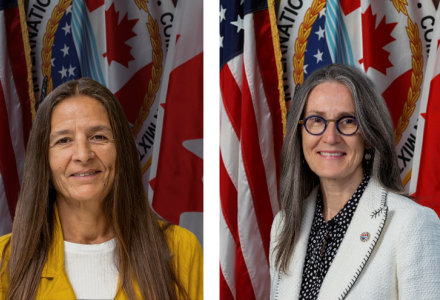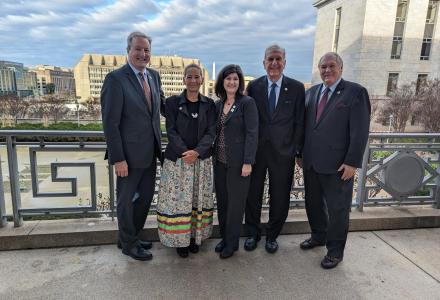
Great Lakes Day events resumed in-person this year, as IJC Commissioners and staff spent the week in Washington, D.C., to inform US lawmakers about the IJC’s Great Lakes water quality roles and responsibilities.
Great Lakes Day was March 9. The event is organized by the Great Lakes Commission and Northeast Midwest Institute and attended by regional leaders and Congress members who play a critical role in shaping Great Lakes policies and investments. The IJC focused its Great Lakes Day discussions with legislators on the IJC Great Lakes Science Advisory Board’s recent “Great Lakes Science Strategy for the Next Decade.”
Now more than ever, the Great Lakes need cutting-edge science and surveillance to better anticipate, predict and understand the impacts of climate change, invasive species, changes in population and land use, and other current and emerging stressors that are rapidly transforming the ecosystem. However, the board found insufficient investment in future-oriented surveillance, monitoring and forecasting, leaving the Great Lakes region vulnerable to threats.

Two Saildrones are prepared to begin autonomous fish surveys in Lake Michigan in 2021. Credit: Saildrone Inc. via USGS
The Science Strategy report summarizes science gaps, related resource needs to strengthen the capacity of science infrastructure, and activities to support data-driven decision-making and associated program investments that secure the Great Lakes region’s future.
Through the Science Strategy, more than 425 experts from Canada and the United States identified six priority areas to focus additional resources through a binational, coordinated Science Plan.
The IJC was not the only organization at Great Lakes Day discussing the need for a Science Plan. As part of their shared priorities for 2023, the Great Lakes Commission and partner organizations recommend that governments “undertake an integrated, binational science plan to address the current and future needs of the Great Lakes.”

IJC Commissioners ran into other Canadian and US Great Lakes champions between meetings with US legislators for Great Lakes Day. Credit: IJC
“As a binational, science-based organization, the IJC saw Great Lakes Day as a venue to educate US legislators about the identified need for a coordinated Science Plan for the lakes,” said IJC Canadian Co-chair Pierre Béland. “It’s important to inform decision makers of opportunities to strengthen our science capacity, better forecast and proactively address future risks, and protect existing investments from the consequences of unanticipated threats,” he said.
IJC acting US Co-chair Rob Sisson added, “Modern problems require modern solutions, and we need to make sure our lawmakers understand the urgency of solving new and emerging Great Lakes threats with cutting-edge tools.”
This includes deploying innovative technologies, greater monitoring and surveillance data to enhance forecasting systems and models, and expanding science infrastructure.
“But of equal importance, this includes Traditional Ecological Knowledge, social science and economics, the wisdom of broader socioeconomic and cultural perspectives, and workforce development to train the next generation of scientists,” Sisson said.
What’s next? The IJC is convening partners to prepare a transnational, basinwide Great Lakes Science Plan for a New Era to implement the Science Strategy, which will describe the science needs, required level of investment and sustainable governance arrangements to better predict and resolve harmful impacts to our freshwater systems.
If you have suggestions for the IJC as it embarks on the development of a Science Plan, send an to ScienceStrategy@ijc.org.

Allison Voglesong Zejnati is public affairs specialist at the IJC’s Great Lakes Regional Office in Windsor, Ontario.

Rachel Wyatt is the communications officer at the IJC’s Great Lakes Regional Office.





